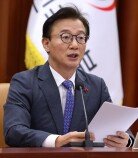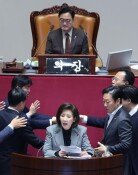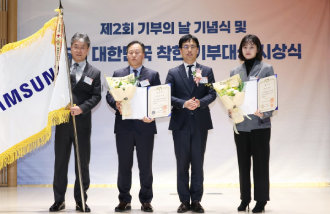Early voting begins, showcasing Korea’s democratic resilience
Early voting begins, showcasing Korea’s democratic resilience
Posted May. 29, 2025 07:31,
Updated May. 29, 2025 07:31
Early voting for the June 3 presidential election begins on May 29 and runs for two days, five days ahead of the main vote. Unlike the main vote, which must be cast at a polling station assigned to one’s address, early voting can be done at any of the 3,568 polling stations nationwide without prior registration. Since its introduction, early voting has become increasingly popular, with nearly half of all voters using it in the previous presidential election three years ago. This is why parties and candidates are strongly encouraging early participation to mobilize their supporters.
This round of early voting is taking place amid widespread conspiracy theories about electoral fraud. Former President Yoon Suk-yeol cited suspected election fraud as one of the reasons for his December 3 martial law declaration, calling it a “collusion with anti-sovereignty forces.” His first public appearance after being removed from office was to attend a documentary screening promoting such conspiracies. Nevertheless, it is a relief that even Kim Moon-soo, the People Power Party candidate who once pledged to abolish early voting, has now distanced himself from the theories and is urging people to vote early.
This presidential election, taking place just six months after Yoon’s attempt to impose martial law, is part of a broader effort to restore the values and institutions of a damaged democracy. The normal operation of election procedures, including early voting, is an essential step in reinstating the procedural legitimacy that a delusional leader undermined. Therefore, the successful and trustworthy execution of the voting process is as crucial as electing a new president. It will help the nation move past the chaos and moral upheaval of the past six months.
This election will not immediately return Korean democracy to complete normalcy. The country is only now beginning its path to recovery, just two months after the Constitutional Court removed the president from office. Had this been a regular election, candidates would have had time for primaries and public scrutiny, allowing voters to assess their qualifications properly. Instead, this snap election has left both candidates and the electorate with insufficient time for thorough evaluation.
Still, the character and leadership qualities of the new president are of paramount importance. The next leader must be capable of healing divisions and uniting the country. They must also possess the ability to tackle domestic economic challenges and external uncertainties. At a time when democracies around the world, including the United States, appear to be backsliding, Korea has an opportunity to demonstrate resilience. Just as the people safeguarded democracy from collapse, they must now choose a president who can restore national dignity and prove that resilience to the world.
Headline News
- South Korea’s migrant population surpasses five percent
- U.S. acting ambassador affirms joint exercises with South Korea
- China and Japan escalate dispute over naval radar incident
- Uptempo claims D3 Seoul basketball championship convincingly
- Democratic Party pushes insurrection court despite opposition warnings







